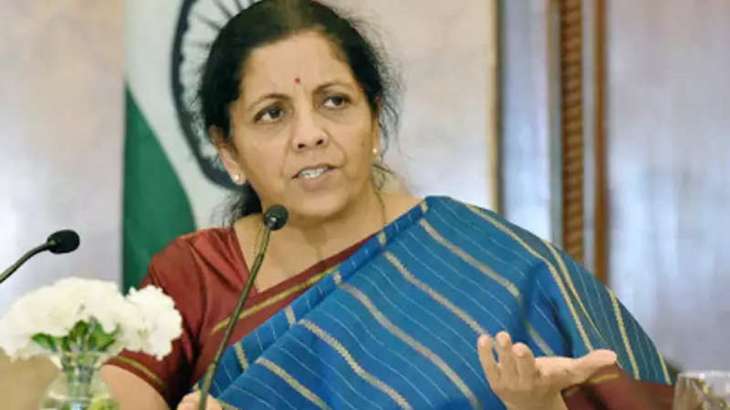


In a heated exchange in Lok Sabha, Finance Minister Nirmala Sitharaman attacked the Congress party and its leader Rahul Gandhi over allegations of caste discrimination in the preparation of the national budget. Responding to a remark by BJP colleague Anurag Thakur, Sitharaman cited instances of the Nehru-Gandhi family's actions against reservations for marginalized communities, exposing their hypocritical stance. The topic of caste-based census further escalated tensions in the House, with Gandhi vowing to fight for its implementation.
In a heated debate in the Lok Sabha, Finance Minister Nirmala Sitharaman accused the Congress party and its leader Rahul Gandhi of caste discrimination in the preparation of the national budget. This followed a remark by BJP colleague Anurag Thakur, who alleged that the Congress had historically favored upper castes in policymaking.
Sitharaman presented instances where the Nehru-Gandhi family had worked against reservations for marginalized communities, highlighting their alleged hypocrisy. The issue of caste-based census further heightened tensions in the House, with Gandhi vowing to continue fighting for its implementation.
The debate on caste discrimination in India has been ongoing for decades. The country has a long history of social stratification and inequality, with the caste system playing a significant role in determining an individual's social status and opportunities.
In recent years, there have been efforts to address caste discrimination through affirmative action policies, such as reservations in education and government jobs for members of marginalized communities. However, these policies have also faced criticism from those who argue that they perpetuate reverse discrimination.
Anurag Thakur, the Union Minister for Information and Broadcasting, has long been a vocal critic of the Congress party. In his speech in the Lok Sabha, he accused the Congress of ignoring the interests of lower castes and favoring upper castes in policymaking.
Thakur cited examples such as the Congress government's opposition to caste-based census, which he argued would help in identifying and addressing the needs of marginalized communities. He also accused the party of failing to fully implement the Mandal Commission's recommendations for reservations in education and government jobs.
Finance Minister Nirmala Sitharaman strongly defended the government's record on caste discrimination. She presented several instances where the Nehru-Gandhi family had allegedly worked against the interests of marginalized communities.
Sitharaman cited Indira Gandhi's decision to abolish reservations in education and government jobs, which was later overturned by the Supreme Court. She also pointed to Rajiv Gandhi's admission that he had no intention of implementing the Mandal Commission's recommendations.
Rahul Gandhi, the former Congress president, responded to the allegations by vowing to continue fighting for the implementation of caste-based census. He argued that such a census would help in identifying and addressing the specific needs of marginalized communities.
Gandhi also criticized the government's economic policies, which he argued had disproportionately benefited upper castes. He called for a more inclusive and equitable approach to development.
Q1: What is caste discrimination?
A: Caste discrimination refers to the unequal treatment of individuals based on their caste membership. This discrimination can manifest in various forms, such as social exclusion, denial of opportunities, and economic deprivation.
Q2: What is the role of caste in Indian politics?
A: Caste plays a significant role in Indian politics, with political parties often relying on caste-based support. This can lead to policies that favor certain castes over others.
Q3: What is a caste-based census?
A: A caste-based census is a census that records the caste affiliation of individuals. It is intended to provide data on the social and economic status of different caste groups.
Q4: Why has there been debate over the implementation of a caste-based census?
A: There is debate over the implementation of a caste-based census because some argue that it could perpetuate caste divisions and stigmatize certain castes. Others argue that it is necessary to identify and address the specific needs of marginalized communities.
Q5: What are the current policies in India to address caste discrimination?
A: India has a number of policies in place to address caste discrimination, including reservations in education and government jobs, anti-discrimination laws, and affirmative action programs.

With early voting just days away, the three major candidates vying to become New York City's next mayor are gearing up for the final debate in what could be their last chance to sway voters. The debate, hosted by Spectrum NY1, The City, and WNYC/Gothamist, will cover issues such as affordability, crime, and the role of former President Donald Trump in the city's politics. With the stakes high and the clock ticking, Democrats Zohran Mamdani and Andrew Cuomo and Republican Curtis Sliwa will need to make a strong case for themselves to secure the future of New York City.

CM Yogi Adityanath's statement about the role of "political Islam" in undermining Sanatan Dharma has sparked controversy and discussion throughout the nation. During an event organized by the Rashtriya Swayamsevak Sangh (RSS), he highlighted the struggles of Indian warriors against political Islam, claiming that this aspect of history is often overlooked. Adityanath's remarks have renewed debates on the representation of India's historical narrative and the impact of colonialism and political Islam.

Samajwadi Party chief Akhilesh Yadav's remarks questioning the government's spending on Diwali celebrations in Ayodhya, and his comparison to Christmas festivities worldwide, have sparked controversy. While the BJP has accused Yadav of being envious of Ayodhya's success, the Vishva Hindu Parishad has criticized him for undermining Indian culture. The comments highlight the tension between political parties over religious and cultural events.

On the occasion of Home Minister Amit Shah's 60th birthday, Maharashtra CM Devendra Fadnavis wished him with a special message on Twitter, calling him the "Chanakya of Indian politics." Fadnavis praised Shah's political acumen and leadership, stating that his contribution to the nation remains unmatched. PM Narendra Modi also conveyed his greetings, commending Shah's dedication to public service and national security. Leaders across India, including former Tamil Nadu CM Edappadi K Palaniswami, extended their wishes and praised Shah's steadfast leadership and tireless dedication.

On Home Minister Amit Shah's birthday, Prime Minister Narendra Modi took to social media to convey his wishes and praise his efforts towards improving India's internal security. Modi highlighted Shah's dedication to public service and hardworking nature, which has earned him admiration from across the country.

In a social media post, Prime Minister Narendra Modi wishes Home Minister Amit Shah on his birthday and acknowledges his dedication to public service. PM Modi also highlights Shah's efforts in strengthening India's internal security. Shah's birthday coincides with the Gujarati new year and he will be attending public events in his home state of Gujarat along with Chief Minister Bhupendra Patel.

In a move to empower widowed women, Madhya Pradesh Chief Minister Mohan Yadav announced on Thursday the implementation of the Kalyani Scheme, offering a financial aid of ₹2 lakh for widow remarriage under Operation Sindoor. This announcement was made at the 377th birth anniversary celebration of Maharaja Chhatrasal, a Bundela warrior known for his courage and national pride. CM Yadav also inaugurated a cultural festival, Virasat Mahotsav, in honor of Maharaja Chhatrasal and the warriors and valor of Bundelkhand.

Prime Minister Narendra Modi celebrates Diwali with Navy personnel aboard INS Vikrant, praising the warship's role in instilling fear in Pakistan. He commemorates India's military might and the bravery of armed forces in Operation Sindoor, while also highlighting INS Vikrant as a symbol of Atmanirbhar Bharat and Made in India. The festive celebrations on board consisted of cultural performances and an air power demonstration, making the occasion deeply symbolic and unforgettable.

Prime Minister Narendra Modi celebrated Diwali with the crew of India's indigenous aircraft carrier INS Vikrant, describing the ship as a symbol of Aatmanirbhar Bharat and Made in India. He saluted the Indian Navy, Air Force, and Army for their courage, skill, and coordination, especially during the 1971 victory over Pakistan. The Prime Minister also highlighted the progress towards self-reliance in India's defence production, with thousands of items now being manufactured domestically and a new indigenous warship or submarine being inducted into the Navy every 40 days on average.

On October 21, Defence Minister Rajnath Singh will honor the sacrifices made by police personnel at the National Police Memorial on Police Commemoration Day. The Memorial serves as a symbol of the strength and selflessness of police officers who have laid down their lives in the line of duty. The central sculpture, 'Wall of Valour', and museum at the Memorial provide a sense of national identity and pride for Police Forces.